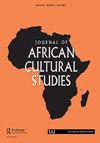Booty Power Politics: The Social-mediated Consumption of Black Female Bodies in Popular Culture
IF 0.9
2区 社会学
Q2 CULTURAL STUDIES
引用次数: 1
Abstract
ABSTRACT This article analyses the concept of booty power, objectification and consumption of the female body in popular culture. Booty power is used here to refer to discourses around the Stocko Sama2K, initially a group of five women who were caught on camera dancing the “John Vul’ igate” song and dance challenge, and their sexualized dance routines. I draw on digital ethnography and interviews to argue that objectification presents us with complexities, and conclude that it is a multi-dimensional maze shaped by different socio-cultural agents. The article casts light on how women’s bodies are used as a source of conversations on decency, morality, power and culture. Objectification theory is used to demonstrate the power of objectification by others and also by the self. The research concludes that objectification and self-objectification worked in both directions, as disempowering and empowering, especially to women, given the conflicting socio-cultural elements at play.Booty权力政治:大众文化中黑人女性身体的社会中介消费
本文分析了流行文化中的战利品权概念、女性身体的物化和消费。Booty power在这里被用来指代围绕Stocko Sama2K的话语,最初是由五名女性组成的团体,她们在“John Vul’igate”歌舞挑战赛中跳舞,以及她们的性化舞蹈套路。我利用数字民族志和采访来论证对象化给我们带来了复杂性,并得出结论,它是由不同的社会文化因素塑造的多维迷宫。这篇文章揭示了女性的身体是如何被用作体面、道德、权力和文化对话的来源的。客观化理论被用来证明他人和自我客观化的力量。研究得出的结论是,鉴于相互冲突的社会文化因素,客体化和自我客体化是双向的,即剥夺权力和赋予权力,尤其是对妇女而言。
本文章由计算机程序翻译,如有差异,请以英文原文为准。
求助全文
约1分钟内获得全文
求助全文
来源期刊

Journal of African Cultural Studies
Multiple-
CiteScore
1.70
自引率
10.00%
发文量
13
期刊介绍:
The Journal of African Cultural Studies publishes leading scholarship on African culture from inside and outside Africa, with a special commitment to Africa-based authors and to African languages. Our editorial policy encourages an interdisciplinary approach, involving humanities, including environmental humanities. The journal focuses on dimensions of African culture, performance arts, visual arts, music, cinema, the role of the media, the relationship between culture and power, as well as issues within such fields as popular culture in Africa, sociolinguistic topics of cultural interest, and culture and gender. We welcome in particular articles that show evidence of understanding life on the ground, and that demonstrate local knowledge and linguistic competence. We do not publish articles that offer mostly textual analyses of cultural products like novels and films, nor articles that are mostly historical or those based primarily on secondary (such as digital and library) sources. The journal has evolved from the journal African Languages and Cultures, founded in 1988 in the Department of the Languages and Cultures of Africa at the School of Oriental and African Studies, London. From 2019, it is published in association with the International African Institute, London. Journal of African Cultural Studies publishes original research articles. The journal also publishes an occasional Contemporary Conversations section, in which authors respond to current issues. The section has included reviews, interviews and invited response or position papers. We welcome proposals for future Contemporary Conversations themes.
 求助内容:
求助内容: 应助结果提醒方式:
应助结果提醒方式:


